Career
In the course of this activity, Strasser became involved in the trade union movement, initially helping to found the United Cigarmakers Union, concentrating for its members upon those tenement-based workers excluded from membership in the Cigar Makers International Union (CMIU). [3] Strasser soon joined forces with the CMIU, editing the monthly magazine established by that union in 1875, the Cigar Makers' Official Journal. [5]
In 1876 and 1877 Strasser was instrumental in helping to establish a central body bringing together New York City's various local trade unions. [3]
Strasser was elected vice president of the Cigar Makers' International Union in 1876 and president in 1877. [3] He continued to serve in that capacity until stepping down from the job in 1891. [3]
During Strasser's term as head of the CMIU the organization began to win strikes which it had previously lost. Between 1871 and 1875 the union had waged 78 strikes, winning just 12, but in the years from 1876 to 1881 a total of 69 strikes had been fought, with 58 resolved in favor of the striking cigar workers. [5]
Strasser was a close ally of Samuel Gompers, siding with him in the early 1880s against the Socialist "Progressive" faction of the Cigarmakers' Union in a split of the union. [2] Strasser also fought against New York's District Assembly 49 of the Knights of Labor for its support of the Progressive Cigarmakers. [2]
In 1886 Strasser was one of five signatories to a call for a convention in Columbus, Ohio, which was to formally establish the American Federation of Labor (AF of L). [2]
Gompers and Strasser were outspoken opponents of the tenement system of production, in which raw materials were provided to workers for manufacture at home. [5] Under their leadership the CMIU attempted to outlaw the practice of home work outright rather than making any effort to organize cigar workers engaged in that form of production. [5]
In 1881 the CMIU adopted use of a special "Blue Label" to denote union-made cigars. [6]
Following his retirement as CMIU president in 1891 he continued to work for the union as an organizer and auditor. [3] He also was active in the American Federation of Labor as a lecturer, lobbyist, and arbitrator of jurisdictional disputes between competing craft unions. [3]
Later years
Strasser left the trade union movement in 1914, becoming a real estate agent in Buffalo, New York, for the next five years. [3]
In 1919 Strasser retired, living first in Chicago through 1929. [2] In 1930 Strasser moved to Daytona Beach, located on the Atlantic coast of the state of Florida, where he lived out the last decade of his life. [2]
Death and legacy
Adolph Strasser died on January 1, 1939, in Lakeland, Florida. [2] He was 95 years old at the time of his death.

William Dudley Haywood, nicknamed "Big Bill", was an American labor organizer and founding member and leader of the Industrial Workers of the World (IWW) and a member of the executive committee of the Socialist Party of America. During the first two decades of the 20th century, Haywood was involved in several important labor battles, including the Colorado Labor Wars, the Lawrence Textile Strike, and other textile strikes in Massachusetts and New Jersey.
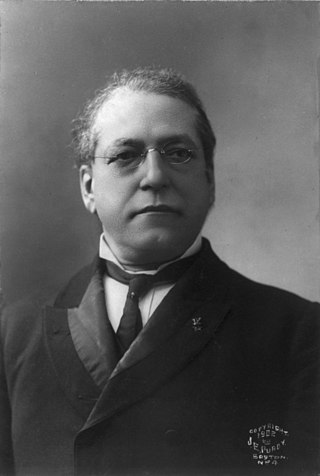
Samuel Gompers was a British-born American cigar maker, labor union leader and a key figure in American labor history. Gompers founded the American Federation of Labor (AFL) and served as the organization's president from 1886 to 1894, and from 1895 until his death in 1924. He promoted harmony among the different craft unions that comprised the AFL, trying to minimize jurisdictional battles. He promoted thorough organization and collective bargaining in order to secure shorter hours and higher wages, which he considered the essential first steps to emancipating labor.

The American Federation of Labor was a national federation of labor unions in the United States that continues today as the AFL–CIO. It was founded in Columbus, Ohio, in 1886 by an alliance of craft unions eager to provide mutual support and disappointed in the Knights of Labor. Samuel Gompers was elected the full-time president at its founding convention and was re-elected every year except one until his death in 1924. He became the major spokesperson for the union movement.

The Federation of Organized Trades and Labor Unions of the United States and Canada (FOTLU) was a federation of labor unions created on November 15, 1881, at Turner Hall in Pittsburgh. It changed its name to the American Federation of Labor (AFL) on December 8, 1886.

Peter J. McGuire was an American labor leader of the nineteenth century. He co-founded the United Brotherhood of Carpenters and Joiners of America in 1881 along with Gustav Luebkert and became one of the leading figures in the first three decades of the American Federation of Labor. He is credited with first proposing the idea of Labor Day as a national holiday in 1882.
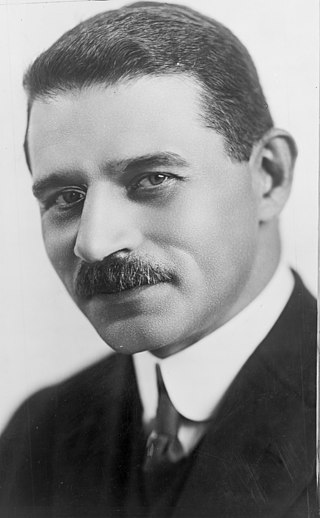
Morris Hillquit was a founder and leader of the Socialist Party of America and prominent labor lawyer in New York City's Lower East Side. Together with Eugene V. Debs and Congressman Victor L. Berger, Hillquit was one of the leading public faces of American socialism during the first two decades of the 20th century.
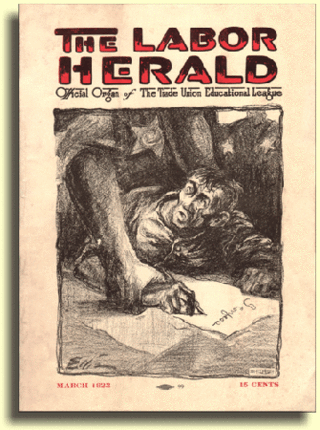
The Trade Union Educational League (TUEL) was established by William Z. Foster in 1920 as a means of uniting radicals within various trade unions for a common plan of action. The group was subsidized by the Communist International via the Workers (Communist) Party of America from 1922. The organization did not collect membership dues but instead ostensibly sought to both fund itself and to spread its ideas through the sale of pamphlets and circulation of a monthly magazine.
The Journeymen Cigar Makers' International Union of America (CMIU) was a labor union established in 1864 that represented workers in the cigar industry. The CMIU was part of the American Federation of Labor from 1887 until its merger in 1974.
Labor federation competition in the United States is a history of the labor movement, considering U.S. labor organizations and federations that have been regional, national, or international in scope, and that have united organizations of disparate groups of workers. Union philosophy and ideology changed from one period to another, conflicting at times. Government actions have controlled, or legislated against particular industrial actions or labor entities, resulting in the diminishing of one labor federation entity or the advance of another.
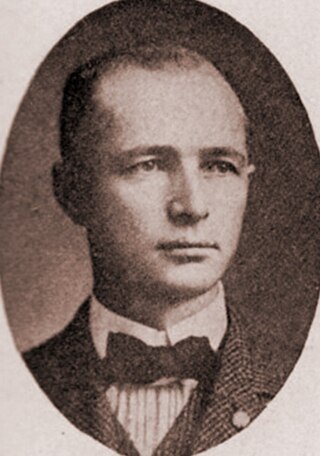
Maximillian Sebastian Hayes was an American newspaper editor, trade union activist, and socialist politician. In 1912 Hayes became the first candidate to challenge Samuel Gompers for the presidency of the American Federation of Labor in nearly a decade, drawing about 30 percent of the vote in his losing effort. Hayes is best remembered as the long-time editor of the Cleveland Citizen and as the vice presidential candidate of the Farmer–Labor Party ticket in 1920.
John Mahlon Barnes (1866–1934) was an American trade union functionary and socialist political activist. Barnes is best remembered as the Executive Secretary of the Socialist Party of America from 1905 to 1911, during which time he originated the idea of the party's 1908 "Red Special" campaign train on behalf of its Presidential nominee, Eugene V. Debs.

Simon Philip Van Patten (1852–1918) was an American socialist political activist prominent during the latter half of the 1870s and the first half of the 1880s. Van Patten is best remembered for being named the first Corresponding Secretary of the Workingmen's Party of the United States in 1876 and for heading it and its successor organization, the Socialist Labor Party of America, for the next six years. In 1883 Van Patten mysteriously disappeared, with his friends reporting him as a potential suicide to law enforcement authorities. He later turned up as a government employee, however, having abandoned radical politics in favor of stable employment.

The Socialist Labor Party (SLP) is a political party in the United States. It was established in 1876, and was the first socialist party formed in the country.
Joseph Patrick McDonnell was an Irish-American labor leader and journalist. He edited the New York Labor Standard, and was one of the founders of the International Labor Union.

The International Working People's Association (IWPA), sometimes known as the "Black International," and originally named the "International Revolutionary Socialists", was an international anarchist political organization established in 1881 at a convention held in London, England.
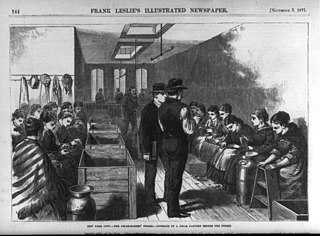
The cigar makers' strike of New York lasted from mid-October 1877 until mid-February 1878. Ten thousand workers walked out at the height of the strike, demanding better wages, shorter hours and better working conditions, especially in the tenement manufacturing locations. The strike was supported by the Cigar Makers International Union of America, local chapter 144.

George Edwin McNeill (1836–1906), was an American mill worker, labor leader, and writer from New England. McNeill is best remembered for a pioneering study of the American labor movement, The Labor Movement, or, the Problem of To-day, published in 1892.
Karl Malcolm Ferdinand Laurrell (1844-1922) was a Swedish labor organizer and Marxist who was exiled from Sweden and eventually emigrated to the United States. He was the secretary of the Scandinavian branch of the International Workingmen's Association and was also involved in union activities in New York City. He was an influential figure for Samuel Gompers, who he took under his wing and mentored. He urged Gompers to put his faith in the organized economic movement of trade unionism rather than the socialist political movement. While he encouraged Gompers to attend socialist meetings he discouraged him from joining. Laurrell represented cigar makers.
John S. Kirchner was an American labor unionist.
The Social-Democratic Workingmen's Party of North America was a Lassallist socialist party.













